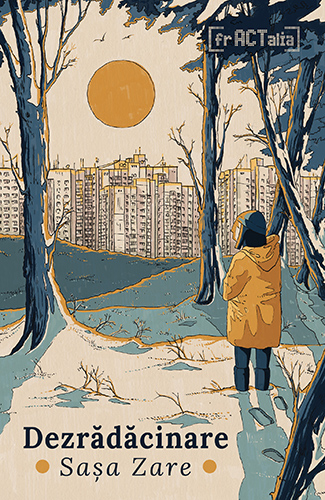

A guest post by Ruxandra Grecu
Dezrădăcinare (the title roughly translates to “Uprootedness”) is a coming of age story exploring elements of sexuality, national identity, and facing sexism as a woman writer. Sașa is both the pen name of the author as well as the name of the fictional main character. Sașa (the character) was born in the Republic of Moldova, where the book takes place, but the book is also partially set in Romania during her university studies. Zare plays with format in the novel, from journal entries written in first person to third person fictionalisation of Sașa’s experiences as part of a book she is working on. Sometimes she even addresses the reader, always using the feminine grammatical gender (which is a pointed act in a language where the masculine is the default). The fragments of story mirror the aspects of the fragmented self trying to come together and coalesce into a cohesive whole. The format of the book is also a great reflection of how trauma can break you to the point where you can’t engage with it wholly, but rather piece by piece.
This is not the first Romanian novel about two women in love, but it is the first I’ve read in which the relationships and characters are not seen heavily through the male gaze. The main character is overtly bisexual and a lot of the novel is about her understanding her sexuality and dealing with internalised homophobia as well as the mainstream homophobia of both Moldova and Romania. She discusses being comfortable with words like gay, queer and bisexual, but uncomfortable with the weight of the word lesbian as she tries to reckon with that.
Year of publication:
2022
Country of publication:
Romania
Page count:
420
English translation:
No
Would Ruxandra recommend this book?
Yes!
We witness her having sexual encounters with both women and men. One of her relationships is with a woman who is simultaneously in an “official” relationship with a man. He doesn’t seem to mind his partner being with another woman because he doesn’t see it as cheating, at least at first.
The prose is quite beautiful; it flows, it’s efficient, at times blunt and emotional, but never cloying. For me it was a powerful reading experience, because I felt seen by the book in a way I hadn’t before. It activated a lot of memories from my childhood that I hadn’t accessed in a long time, returning fragments of my own identity that I’d rejected or looked away from. It’s difficult for me to write about because it was a very emotional experience to read this in my own language, a rare and welcome opportunity. I related to the challenges of the Romanian literary establishment in which women are lauded for writing in a masculine way. This is just another performance for Sașa along with the performance of being a good daughter, a good “lesbian”, a good speaker of Romanian (without a specific accent). It’s quite powerful to witness her shedding these performances, one by one, getting to the core of herself.
The novel won the Sofia Nădejde Award for Best Debut in Prose (awarded to Romanian women writers), and Zare won the Young Fiction Writer of the Year Award (awarded to young Romanian writers).
